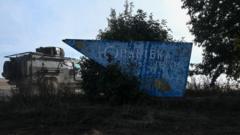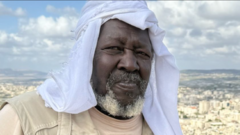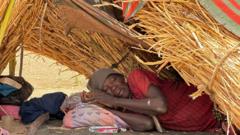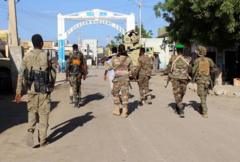In the aftermath of a wave of sectarian violence that devastated the Alawite community in northern Syria, allegations against Syrian security forces and armed civilians reveal a troubling dynamic. Survivors recount harrowing tales of summary executions, while the regime navigates a delicate balance of power amidst fears of escalating violence.
Alawite Community Faces Sectarian Violence Amid Shifting Power Dynamics in Northern Syria
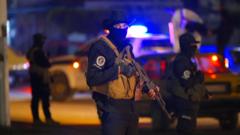
Alawite Community Faces Sectarian Violence Amid Shifting Power Dynamics in Northern Syria
Accusations emerge against Syrian security forces as armed civilians spill blood in recent sectarian clashes, highlighting the complexities of a new regime navigating a fractured society.
Amidst the ongoing turmoil in Northern Syria, alarming details have surfaced regarding a recent surge of sectarian violence against the Alawite minority. Reports indicate that a man identified as Abu Khalid, one of several accused participants, claims that he and other armed civilians received guidance and monitoring from government forces during their intervention in conflict-ridden areas.
Abu Khalid recounted his journey to Sanobar village on March 7, where the General Security department allegedly instructed him and his group to refrain from attacking civilians, targeting only insurgents instead. However, his narrative took a dark turn when he was filmed apparently executing a 64-year-old villager, Mahmoud Yusef Mohammed, raising significant doubts about his claims of self-defense.
Witnesses in the coastal region have reported extensive civilian casualties throughout the violence which erupted as a reaction to early March insurgent attacks that targeted remnants of the prior regime. Human rights organizations suggest an alarming death toll, with estimates indicating that nearly 900 civilians, primarily Alawite, have lost their lives as vengeance surged through pro-government forces.
In Sanobar alone, the consequences of this violence are palpable, with entire families displaced and a mass grave marking the site of heavy loss. Survivors recounted chilling accounts of armed groups conducting raids, instilling terror as they executed some villagers before the eyes of their loved ones.
The incident involving Abu Khalid and the gruesome video capturing Mahmoud's death has now attracted the attention of military authorities, leading to his detention as they attempt to navigate the complex narratives of accountability amidst rampant fear within the communities. Survivors have recounted the frantic moments before Mahmoud's death, illustrating a stark divide in the realities faced by Alawites against the backdrop of newfound insurgents and unresolved resentments.
As investigations unfold, the government aims to reassure minority groups by promising accountability for those responsible for the bloodshed. Nevertheless, deep-seated fears linger regarding the rising influence of hardline factions that threaten the fragile peace. The road ahead remains uncertain, as Syria's new regime attempts to consolidate control while balancing the needs and fears of its diverse populace, keeping a wary eye on the specter of vengeance and sectarian violence.


